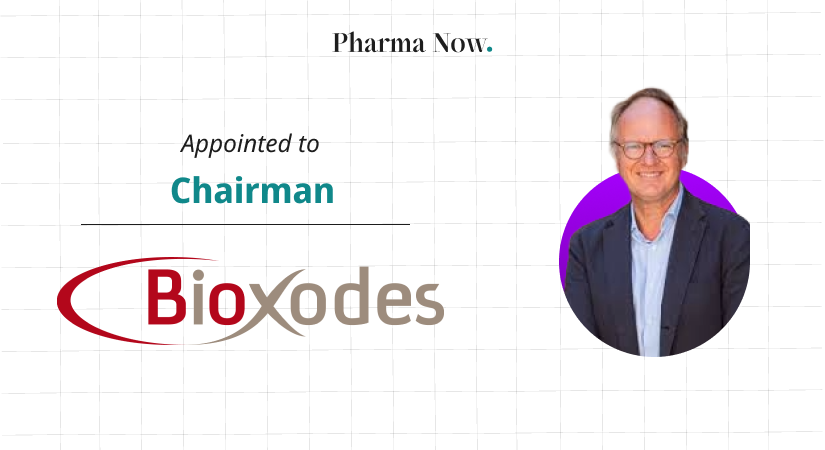Bioxodes Announces The Appointment Industry Veteran Philippe Monteyne As Chairman To Lead Late-Stage Development Of Its Breakthrough Stroke Candidate
Bioxodes appoints Dr. Philippe Monteyne as Chairman to guide BIOX-101’s Phase 2b development for hemorrhagic stroke.
Breaking News
Oct 08, 2025
Simantini Singh Deo

Bioxodes SA, a clinical-stage biopharmaceutical company specializing in novel therapies for the prevention and treatment of thrombotic and inflammatory diseases, has announced the appointment of Philippe Monteyne, MD, PhD, as Chairman of its Board of Directors. Dr. Monteyne, a neurologist by training, brings a strong background as both a life sciences investor and a pharmaceutical executive, with extensive experience leading drug development and commercialization efforts across multiple therapeutic areas.
Chief Executive Officer of Bioxodes, Marc Dechamps, described the appointment as a significant milestone for the company. He stated that Dr. Monteyne’s experience in developing innovative therapies for high unmet medical needs will be invaluable as Bioxodes advances its lead candidate, BIOX-101, through clinical development.
“The appointment of Philippe as Chairman is a great win for Bioxodes. His experience and track record in developing new therapies in areas of high unmet medical need will lend invaluable guidance to the company just as new data have confirmed the breakthrough potential of BIOX-101 in treating stroke,” said Dechamps. “I’m looking forward to working with Philippe as we advance this first-in-class drug candidate through clinical trials, with the aim of commercialization, potentially as early as 2030. We have benefited enormously from Pierre Detrixhe’s work as chairman over the past years, and I thank him for his leadership and look forward to continuing to work with him as a member of the Board of Directors.”
Dr. Monteyne assumes his new position as Bioxodes prepares for a potentially registrational global Phase 2b clinical trial of BIOX-101 in patients suffering from intracerebral hemorrhage (ICH). If successful, this trial could form the basis for conditional marketing authorization applications in both the United States and Europe. Beyond ICH, Bioxodes also plans to develop BIOX-101 for the treatment of acute ischemic stroke, expanding the therapeutic potential of its lead asset.
Dr. Monteyne currently serves as Senior Advisor for Life Sciences at AltamarCAM Partners, which manages over €20.8 billion in private market investments. He is also a member of the Investment Committee and previously served as a partner at Aliath Bioventures in Barcelona, as well as a senior partner at Fund+, a Belgium-based private equity fund focused on life sciences. His prior industry experience includes senior leadership roles at SmithKline Beecham, GSK, and Sanofi.
At GSK, Dr. Monteyne played a pivotal role in the development and launch of several key therapies, including the cervical cancer vaccine Cervarix®, the gene therapy Strimvelis® for ADA-SCID, and the oligonucleotide therapy Tegsedi® for hereditary ATTR amyloidosis. In addition, he serves on the boards of several biotech companies in Belgium, France, and Spain, and has previously held an academic appointment as a visiting professor of neurology at the Catholic University of Louvain (UCL, Belgium).
Commenting on his appointment, Dr. Monteyne expressed strong enthusiasm about Bioxodes’ lead program and its potential to transform stroke treatment. “Hemorrhagic stroke is an unmet medical need and one of the most pressing unresolved neurological problems science is facing. I’ve been very impressed by the Phase 2a results with BIOX-101, and I believe it could revolutionize treatment of stroke, offering a solution for a disorder that, unfortunately, often leads to crippling disabilities or death,” he said. “With no approved therapies for hemorrhagic stroke available today, BIOX-101 promises a unique opportunity to help shape an entirely new market by arming physicians with a drug that may significantly reduce mortality and improve outcomes for this lethal disease.”
Bioxodes recently announced positive interim findings from its BIRCH Phase 2a trial of BIOX-101, which demonstrated strong potential for the treatment of hemorrhagic stroke. All patients treated with BIOX-101 showed a reduction in hematoma size, supported by biomarker data consistent with the clinical outcomes. Functional recovery also appeared to be more favorable compared to the standard-of-care control group, with a higher proportion of BIOX-101-treated patients regaining independence by day 90.
Intracerebral hemorrhage (ICH) is a severe and often fatal condition that accounts for approximately 15% of all strokes but causes around 40% of stroke-related deaths. Mortality rates can reach 50% within 30 days, and about half of these deaths occur in the first 24 hours. Survivors often face long-term disability, with fewer than 20% achieving functional independence six months after the event. The damage from ICH is not limited to the initial bleeding but is compounded by secondary processes such as neuroinflammation, ischemia, and neuronal injury.
BIOX-101 is a proprietary recombinant version of a naturally occurring protein found in the saliva of the tick Ixodes ricinus. It has been designed to counteract the secondary effects of hemorrhagic stroke, such as ischemia and inflammation, without increasing the risk of bleeding. Unlike conventional anticoagulants, BIOX-101 targets Factors XIa and XIIa of the intrinsic coagulation pathway to reduce clotting while maintaining hemostatic balance. Additionally, it exerts anti-inflammatory effects by preventing the activation of neutrophils and the release of neutrophil extracellular traps (NETs), which contribute to excessive inflammation and further brain damage.
Following the completion of a successful Phase 2a proof-of-concept study, Bioxodes is now preparing for a global Phase 2b trial in intracerebral hemorrhage and additional Phase 2 trials to evaluate BIOX-101 in acute ischemic stroke and another undisclosed indication. Through these clinical efforts, the company continues to advance its mission of developing innovative therapies that address some of the most critical unmet needs in cardiovascular and neurological care.
